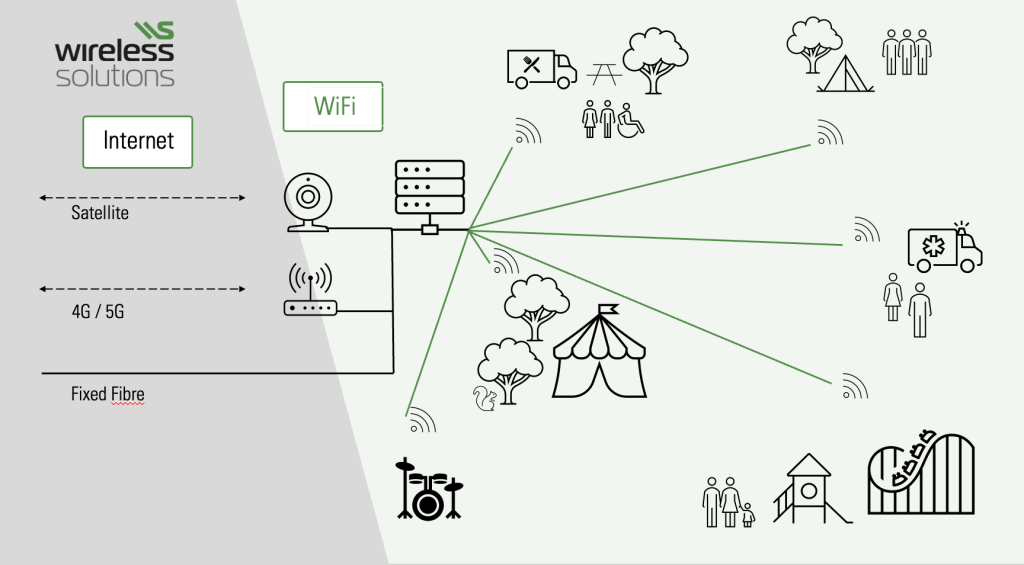You’re running an event, but have you thought about the internet? Without a strong internet supply, and a stable WiFi network to allow users to access it, you might struggle to get your event online.
And if you don’t have internet coverage for your event, how are you going to promote your event over social media, access event critical systems, process payments, communicate with each other…..and more?
Chances are, connectivity will be a critical part of your event to ensure that it runs efficiently and is profitable.
Temporary internet for events
The good news is that we can now access temporary event internet services, which are specifically designed for the job. Quick to install, fully managed and now even more reliable, they can get you connected for as long as you need.
In this blog, we’re going to cover how to get temporary internet for your event and answer some important questions along the way.
For example:
- What’s the difference between internet and WiFi?
- Is there a difference between internet for an outdoor and an indoor event?
- What temporary event internet options are there and which one is best for me?
If you’re tasked with getting internet for your event, but don’t know your ‘high availability’ from your ‘Starlink’ then then we’re here to help.
This article makes sure that you ask the right questions, and get the right internet solution for your event. We cover:
1. Do you need internet, WiFi or both for your event?
2. The 3 main types of internet connection – Fixed fibre, Satellite and 4G/5G
3. Checking what’s already available
4. Finding the right temporary internet provider for your needs
5. What else you should consider to get everyone connected for your event
6. Common mistakes
Do I need internet or WiFi or both?
You may be tasked with getting internet for an event that you’re running. But what does ‘internet’ actually mean? And how to you ‘get it’?
The first thing to know is that you’re going to need to ask a few more questions. Let’s explain:
The internet is what we all connect our devices to in order to access the outside world. It’s over the internet that we share information and communicate data across the globe.
Picture yourself at an event. You have an internet connection at the main entrance to the site. But how do you allow devices across the entire event site to connect to the internet?
Now you’re talking WiFi. This image should helps explain the differences between ‘internet’ and ‘WiFi’.

On the left we can see the internet connection, supplying the site. On the right you can see the WiFi network, allowing users across the site to connect wirelessly to access points, which are connected by fibre to the switch (where all the clever techie stuff goes on), which relays the data to the outside world over the internet.
This is just one example of how your WiFi network may look. But hopefully it gives you the knowledge to work out whether you need just the internet connection, or a WiFi solution for your event.
The 3 types of internet connection
There are 3 main types of internet connection:
Fixed Fibre
The best internet supply is a fixed fibre, or leased line coming into the event site. Why? Because it’s the most reliable. A closed tunnel, only the person that owns the fibre can pass data down it, meaning that you can control access to the internet connection.
No contention from outside sources, a more secure line, and complete control of your internet connection.
Satellite
Satellites transmit bandwidth over radio frequencies. They beam the data up into space, and then that data gets relayed down to earth again. Satellite technology is becoming more accessible and easier to use for events with the launch of Starlink, and the quality of the connection is currently good, but as adoption increases we are at risk of getting contention in the skies (too much noise that can cause interference and reduce the quality of the signal). Read more about the pros and cons of Starlink for events.
4G / 5G
Also referred to as LTE, 4G and 5G can provide an internet connection for your event. But be careful. If you’re in an area where masts are limited, and lots of people descend into a space who all require connectivity at the same time, then you may end up with the network being flooded.
And that only means one thing: no connectivity for anyone!
Whilst there are tricks that can help prioritise the 4G/5G signal towards that need it most, you’re still going to encounter difficulties. And none more so than at outdoor events in green field sites. Due to the very nature of these rural sites, the signal strength was never designed to be very strong at the best of times, meaning that there’s even less to go around.
Our advice when it comes to choosing an internet connection? Speak to a connectivity specialist that works with similar sites to yours (whether this is a building, greenfield site or somewhere that offers unique challenges, like underground event spaces). They’ll have the experience to recommend the best internet solution/s for your event. And it may involve a combination of the above!
What’s already available on site?
One trick that many event organisers (and internet providers) overlook is to explore the available internet connections that you can tap into. We’re not just talking about identifying any internet connections that the land owners may have, you can also look at those owned by the buildings around.
The best place to start is to talk to the person in charge of the event space. It’s a trick we use often.
A good example of this technique is Henley Regatta, where WiFi is required up and down the length of the river Thames. There are various different land owners happy to earn a revenue from the use of their fixed line. And they’re not even on the same side of the river, we beam some of the internet in from across the water!
It’s worth talking to local land owners and seeing what you can utilise from the local area.
Finding the right internet provider for your needs
Not many event production teams have an event connectivity specialist as part of their team. More commonly it’s an external provider or contractor brought in who will have the technical equipment along with the expertise.
But is one event WiFi provider really different from another? Well, the truth is that yes, they can all very different. And let’s explain why we say this.
Some will specialise in indoor events. Here, some of the internet and WiFi infrastructure is always in situ, so the provider will utilise an already-available hardware infrastructure. They will bring in their own networking tools to configure the hardware to give users the right access, and lay any peripheral access points to adapt the WiFi layout.
Some connectivity providers specialise in outdoor events where they are used to starting with a greenfield site. Here they’re probably bringing in the internet, laying cables across the site, and installing access points around the site. These are hardware elements which may already be present at indoor event venues.
Read out article on why WiFi for outdoor events is different to WiFi for indoor events.
Then there’s the complexity of the network to think about. Whereas some temporary WiFi providers will be using a simple solution of 4G/5G, access points and very little else. This ‘portable WiFi box’ solution isn’t designed to cope with more than a few users connecting in a site where there isn’t a huge amount of contention from the general public.
Our advice? Look for a supplier that has successfully delivered an event to the size and complexity of yours, and then get customer references. It sounds cliche but it really is worth doing your due diligence here.
What else you’ll need to consider to get everyone connected for your event
The larger and more complex your event WiFi needs, the further in advance you should be preparing for the event. For something as large as Badminton Horse Trials, the briefing, planning and preparing starts a good 5 months prior to the event.
For a smaller event site where you’re only looking to connect critical functions over a small area, a solution can be designed and installed within a week.
Timescales are therefore important to consider.
As is the brief you give to your WiFi provider. In order for connectivity to be a success, you’ll want to fully brief your supplier. Understanding the areas you’ll need connectivity in, what activities you’ll need connectivity for in each area (is it trader payments, live streaming, crew communications etc), and when you’ll need it is a really important part of your provider being able to deliver for you.
And you’ll learn from every event, because every event will introduce new scenarios for your connectivity to deal with. Make a note of these learnings and include them in the brief for the following year. It’s only by being through with your debriefing process that you’ll learn and improve. You’d be surprised by how many requests we get for last minute connectivity requirements once the network is built and working, due to ‘forgotten’ or ‘last minute’ requirements. It’s important to be aware that these can’t always be accommodated due to how they will affect the network design.
Common mistakes
Aside from using a contractor or supplier who is lacking the relevant expertise of working in your event environment, there are some common things that can go wrong which will impact your connectivity during the event.
Inadequate power
The biggest dependancy for WiFi is site power. So it’s important to get good power guys, and make sure they are fuelling the generators 24 hours a day. As soon as a generator stops, your WiFi could stop. It’s the most common point of failure, so get a good event power supplier and keep them.
You’ll also want to ensure that there’s adequate testing time for the WiFi service. This means that you’ll need to have your site power in and switched on a ferw days before the event starts, to allow for the pre-live testing.
Lack of resilience
Because you’re dealing with hardware that can break, it’s wise to have inbuilt resilience. This means a spare internet supply, spare network switches and spare hardware in case of failure.
But ‘resilience’ comes on a sliding scale. The term ‘high availability’ means that if any one point of failure breaks, the standby immediately picks up the load and there it no interruption to your business. This is the ideal solution, and worth exploring.
It all depends how reliant your event is on 100% uptime. The good thing is that it’s all possible.
This article covers some of the challenges larger events face with their connectivity and how you can proactively protect yourself against them. How to achieve robust WiFi at large events.
Summary
Temporary internet for events is now a standard that’s largely expected. And as internet services improve, additional services can be run from the network.
People counting, data capture, CCTV, VOIP services and more are all now growing in utilisation as event internet services improve.
The heart of event technology, and enabler for advanced event capability, event internet is becoming ever more critical to event success, and high availability internet is in increasingly high demand.

